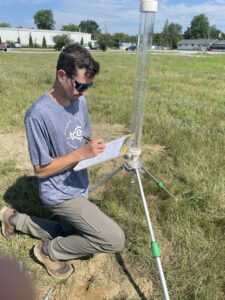Understanding the behavior of water infiltration into soils is crucial for a wide range of projects, from structural foundations and embankments, to flood management, hydraulic conductivity, and more! One instrument that plays a pivotal role in this is the Guelph Permeameter.

Soil permeability, also known as hydraulic conductivity, refers to the ability of water to flow through ground materials. It is a vital parameter in engineering and environmental studies as it directly influences the effectiveness of water management systems. By determining soil permeability (measurement of how water and air are able to move through the ground), TCE engineers can make informed decisions regarding stormwater treatment systems. It is one of the approved methods for State testing for infiltration-based treatment practices for stormwater projects. This is usually done at the same time as soil test pits.
Using a Guelph Permeameter gives information on percolation rates, whereas soil test pits give you information on soil textures and distances to the water table. Stormwater tests such as these that TCE’s engineers perform give us information about drainage systems, groundwater recharge, contamination remediation, and various other factors that involve water movement through the subsurface. Using all of that information is what allows us to design the best stormwater solutions for your site.
The Guelph Permeameter is an instrument designed specifically for soil testing, allowing accurate measurement of water infiltration into soils. How does the Guelph Permeameter work? Our engineers use the Guelph Permeameter by inserting the instrument into the soil, ensuring a tight seal between the cylinder and the ground, then water is poured into the cylinder and the water level is carefully observed. By monitoring the water level change over a set duration, the hydraulic conductivity of the soil can be determined while the Guelph Permeameter provides precise data on the rate of water movement through the soil.
If you are undertaking a project that requires knowledge of soil permeability, such as a project involving stormwater treatment, which is often needed in projects relating to 3 acre permitting and larger new developments, or are interested in learning more about the Guelph Permeameter, do not hesitate to reach out to TCE at 802-879-6331 or or contact us online. Our team of engineering experts can provide guidance, support, and further information to help you make informed decisions for all your project needs.



